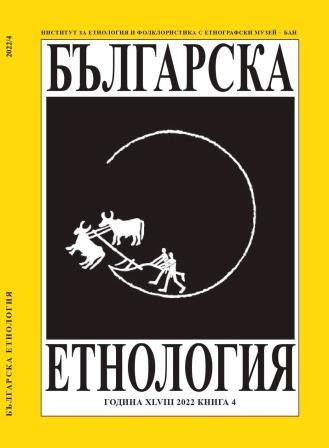Газопровод. Албум на българските строители в СССР
Gas Pipeline. Album of the Bulgarian Builders in the USSR
Author(s): Nikolai NenovSubject(s): History, Anthropology, Social Sciences, Customs / Folklore, Local History / Microhistory, Oral history, Recent History (1900 till today), Cultural Anthropology / Ethnology, Culture and social structure , Economic development, Migration Studies
Published by: Институт за етнология и фолклористика с Етнографски музей при БАН
Keywords: Рhotography; visual anthropology; propaganda; images of heritage
Summary/Abstract: The present text offers reading of an album that contains the visual history of a group of Bulgarian builders, working in the USSR on a contract. Their activity is to assure access to natural gas for Bulgaria. The album is printed as a special edition for only 130 workers. It contains their names and personal photos, images from the working process, as well as from the cultural events of the workers – folklore dances, choir formations, which are subdued to a general ideological discourse. The political manifestations are not forgotten, too – celebrating anniversaries from revolutions, March 8th (International Women’s Day), as an element of the festivity calendar of the communist societies. The album is a product of ideological propaganda, which displays the achieved communist dream by presenting the desired as real. Within this topic construction is a key element, because it refers not only to the actual building of facilities and structures but also to the social engineering – the creating of the“Socialist Man“.A second plan in the album is a large number of photos from Bulgaria, which have no actual relation to the topic of the gas pipeline and the building works. They are displaying emblematic places of heritage – monasteries, old houses and tourism – new resort and vacation storylines. These are part of the official images of the country in front of the world, displayed as achievements of the communist authority. The images, controversial at first sight, are combined within the general propaganda narrative of the album, which affirms memory within the community of the workers and creates a positive relationship. The participation in construction works outside the country is not only a manifestation of the policy of “internationalism“, but also a form of personal benefit, because the payment is different and assures access to various deficit goods, like an automobile for instance. All of this imposes the necessity for the evidence from the period of communism to be positioned within the context that caused them. They are to be examined critically since the photos in the album do not only display reality – they are not a moment shot in time but are mainly a constructed positive world of a society, which does not offer alternatives in thinking.
Journal: Българска етнология
- Issue Year: 2022
- Issue No: 4
- Page Range: 496-507
- Page Count: 12
- Language: Bulgarian

